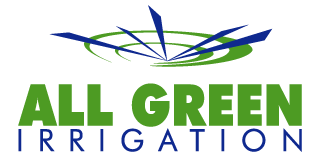Frequently Asked Questions
Q. Is there anything I need to do in preparation for my irrigation/sprinkler system installation?
No. All Green Irrigation is a full-service irrigation company who will take you through the irrigation installation process from start to finish. We contact Ontario 1 Call to locate all underground utilities on your property.
Q. After my sprinkler system is up and running, is there anything else I need to do?
Typically, no. However, simple adjustments of the controller may be necessary to ensure an adequate watering cycle and duration. Your system is virtually maintenance-free with proper seasonal servicing.
Q. Will my irrigation system still run when it’s raining?
The installation of an automatic rain sensor is standard on systems we install and will ensure that after rainfall has accumulated, the system will temporarily stop the automatic watering cycle. The rain sensor will then detect when the system needs to be re-activated (after sufficient drying time).
Q. What sort of or how much damage to my lawn should I expect?
All Green Irrigation uses a great deal of caution during our installations and we use machinery that minimizes turf damage. There is a chance that you may have to repair only limited portions of your lawn. The likelihood of damage depends upon how well-established your turf is and upon your soil conditions. Usually in a couple of weeks’ time, you would never even know we had been to your home.
Q. I have a well or pond on my property. Can I still have an irrigation system installed?
Certainly. We specialize in designing pump systems from wells, lakes, rivers, etc. for your water supply. With today’s advanced technology, there are numerous options available.
Q. I’m having some work done at my property. Should I wait until they’re done to have the sprinkler system installed?
The type of work being done will ultimately determine the proper time frame. For instance, if you are having a new lawn installed or repaired, we would be the second-to-last step in the process, with the last being either your hydroseed or sod. In the case of general building or construction, we can typically work around other contractors unless a large portion of our installation area is obstructed. In this scenario, it would be best to wait until completion of the project. Please contact usfor more information on our recommended time frames.
Q. Is there any upkeep involved after your installations?
Our service schedule includes a spring turn-on and a winter shut-down. We will contact you to schedule both of these appointments.
Q. How long does it take for you to install an irrigation or sprinkler system?
Usually our installations take only one day, but in some cases, additional time may be necessary.
Q. Why are the lights more expensive than those in my local home improvement store?
The difference between the lighting products used by All Green and the ones you can buy at your home improvement store is quality, warranty, and having a professionally designed system.
The quality of the materials used by All Green is evident in the look and feel of the fixtures; solid brass and copper, instead of copper plated. Advancements in powder coating techniques found in top quality aluminum fixtures prevents corrosion and other damage. Our manufacturers stand behind their products with excellent warranties. Substandard fixtures just will not hold up to the elements, causing untimely replacements.
Q. What should I expect when I call for a free landscape lighting consultation and estimate?
Our Lighting Designer will meet with you to discuss your lighting needs to ensure that his design covers all the key reasons that you want lighting. In addition, he/she will walk the property and assess any other suggested lighting options, design a custom lighting portrait, and provide you with a free estimate.
Q. What are the advantages of low voltage landscape lighting over high voltage systems?
The biggest ones are safety and cost!
Of course, safety is of the highest importance. High-voltage systems (120v) must remain moisture-free to prevent potential shock hazards if wires are compromised. A low-voltage system (12v) is specifically designed to not warrant this concern.
High voltage systems are more expensive to operate than low voltage fixtures, as they require more electricity which obviously increases your electric bill. Also, higher costs may be incurred if a fixture(s) need to be relocated.
Burying 120 volt system wiring can be problematic due to depths and the need for protective conduit. Low-voltage system (12v) wires do not have the same constraints, which offers the customer more flexibility for future changes than the 120 volt counterpart.
Aesthetically, 12 volt system fixtures are smaller and less obtrusive. In addition, they offer a wider variety of precise, as well as artistic lighting effects. The higher watt bulbs of the 120 volt systems create unwanted glare and reduces the ability to create subtle landscape lighting effects.

